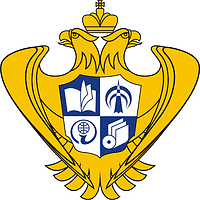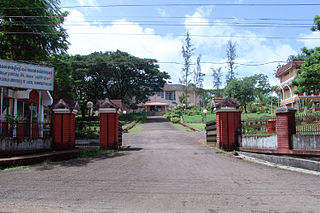Related Research Articles

Calico is a heavy plain-woven textile made from unbleached, and often not fully processed, cotton. It may also contain unseparated husk parts. The fabric is far coarser than muslin, but less coarse and thick than canvas or denim. However, it is still very cheap owing to its unfinished and undyed appearance.

Screen printing is a printing technique where a mesh is used to transfer ink onto a substrate, except in areas made impermeable to the ink by a blocking stencil. A blade or squeegee is moved across the screen to fill the open mesh apertures with ink, and a reverse stroke then causes the screen to touch the substrate momentarily along a line of contact. This causes the ink to wet the substrate and be pulled out of the mesh apertures as the screen springs back after the blade has passed. One colour is printed at a time, so several screens can be used to produce a multi-coloured image or design.

Printing is a process for mass reproducing text and images using a master form or template. The earliest non-paper products involving printing include cylinder seals and objects such as the Cyrus Cylinder and the Cylinders of Nabonidus. The earliest known form of printing evolved from ink rubbings made on paper or cloth from texts on stone tablets, used during the sixth century. Printing by pressing an inked image onto paper appeared later that century. Later developments in printing technology include the movable type invented by Bi Sheng around 1040 AD and the printing press invented by Johannes Gutenberg in the 15th century. The technology of printing played a key role in the development of the Renaissance and the Scientific Revolution and laid the material basis for the modern knowledge-based economy and the spread of learning to the masses.

Dye-sublimation printing is a term that covers several distinct digital computer printing techniques that involve using heat to transfer dye onto a substrate.
A trade association, also known as an industry trade group, business association, sector association or industry body, is an organization founded and funded by businesses that operate in a specific industry. Through collaboration between companies within a sector, a trade association participates in public relations activities such as advertising, education, publishing and, especially, lobbying and political action. Associations may offer other services, such as producing conferences, setting industry standards, holding networking or charitable events, or offering classes or educational materials. Many associations are non-profit organizations governed by bylaws and directed by officers who are also members.. Many associations are non-profit organizations governed by bylaws and directed by officers who are also members..
SPIE is an international not-for-profit professional society for optics and photonics technology, founded in 1955. It organizes technical conferences, trade exhibitions, and continuing education programs for researchers and developers in the light-based fields of physics, including: optics, photonics, and imaging engineering. The society publishes peer-reviewed scientific journals, conference proceedings, monographs, tutorial texts, field guides, and reference volumes in print and online. SPIE is especially well-known for Photonics West, one of the laser and photonics industry's largest combined conferences and tradeshows which is held annually in San Francisco. SPIE also participates as partners in leading educational initiatives, and in 2020, for example, provided more than $5.8 million in support of optics education and outreach programs around the world.
The International Federation of Library Associations and Institutions (IFLA) is an international body representing the interests of people who rely on libraries and information professionals. A non-governmental, not-for-profit organization, IFLA was founded in Scotland in 1927 with headquarters at the National Library of the Netherlands in The Hague. IFLA sponsors the annual IFLA World Library and Information Congress, promoting access to information, ideas, and works of imagination for social, educational, cultural, democratic, and economic empowerment. IFLA also produces several publications, including IFLA Journal.

Textile printing is the process of applying color to fabric in definite patterns or designs. In properly printed fabrics the colour is bonded with the fibre, so as to resist washing and friction. Textile printing is related to dyeing but in dyeing properly the whole fabric is uniformly covered with one colour, whereas in printing one or more colours are applied to it in certain parts only, and in sharply defined patterns.
The International Typographical Union (ITU) was a North American trade union for the printing trade for newspapers and other media. It was founded on May 3, 1852, in the United States as the National Typographical Union, and changed its name to the International Typographical Union at its Albany, New York, convention in 1869 after it began organizing members in Canada. The ITU was one of the first unions to admit female members, admitting women members such as Augusta Lewis, Mary Moore and Eva Howard in 1869.

AATCC—the American Association of Textile Chemists and Colorists— is a 501(c)(6) not-for-profit professional association that provides test method development, quality control materials, educational development, and networking for textile and apparel professionals throughout the world.

The Federal Agency for Press and Mass Communications (FAPMC) was a regulatory state agency within the hierarchy of the Russian Government.
Glasgow Print Studio is an arts organisation situated in Glasgow, Scotland. Founded in 1972, Glasgow Print Studio is an organisation with charitable status that exists to encourage and promote the art of printmaking; it is supported by the Creative Scotland and Glasgow City Council.
Xplor International also known as The Electronic Document Systems Association is an international trade association specifically focused on the issues of transaction documents. Transaction documents are legally relevant documents that are either printed and mailed or are electronically delivered e.g. bills, bank statements, insurance policies etc. The goal of the organization is to promotes "best practices for the design, production and delivery of electronic documents."

Kerala Institute of Local Administration, abbreviated as KILA, is an autonomous training, research and consultancy organisation constituted under the Ministry of Local Self Government, Government of Kerala, registered as per Travancore – Cochin Literacy, Scientific and Charitable Societies Act-1955. KILA was established in 1990, in the pattern of a national institute, with the main objective of supporting local governance.
Direct-to-garment printing (DTG) is a process of printing on textiles using specialized aqueous ink jet technology. DTG printers typically have a platen designed to hold the garment in a fixed position, and the printer inks are jetted or sprayed onto the textile by the print head. DTG typically requires that the garment be pre-treated with a PTM or pre-treatment machine, allowing for the following:
Kornit Digital Ltd. is an Israeli-American international manufacturing company. It produces high-speed industrial inkjet printers, pigmented ink and chemical products for the garment and apparel, home goods, textile accessories and decorating industry.

The RemaxWorld Expo is an annual trade show comprising vendors from within the print consumables industry. The event began in 2007, resulting from a joint venture between the China Council for the Promotion of International Trade (CCPIT) and Recycling Times Media Corporation. Centered in Zhuhai, widely recognized as being the print consumables capital of the world, the exhibition currently takes place in the newly constructed Zhuhai International Convention & Exhibition Center. In 2015, the show accommodated 463 exhibitors and 13,938 visitors from 83 countries.
The printing industry in India is an important industry in that country.

The Printing and Kindred Trades Federation (P&KTF) was a trade union federation in the United Kingdom.
Direct-to-film printing (DTF) is a process of printing on textiles. The process involves the direct transfer of a design by first printing it on a special film and then using a heat press to transfer the design to a garment.
References
- ↑ "Print | United Kingdom".
- ↑ "FESPA launches free technology guides for association members". 19 June 2015.
- ↑ "FESPA Launches Free Technology Guides for Association Members".
- ↑ "AD Communications | FESPA progresses regional re-investment programme with support for next-generation Turkish printers". AD Communications. Retrieved 1 May 2023.
- ↑ "Home". wrap-masters.com.
- ↑ "UK's Fespa award-winners hail benefits of triumph".
- ↑ "FESPA Global Summit 2014".
- ↑ "Michel Caza - Profile | Printerlink" . Retrieved 1 May 2023.
- ↑ "FESPA Associations/Members, International Printing Association, Find a Partner - FESPA". Archived from the original on 28 June 2015. Retrieved 26 June 2015.
- ↑ "Christophe Aussenac assumes FESPA Presidency". FESPA.com.
- ↑ "Results From First-Ever FESPA World Wide Survey Now Available". fsb.org.uk. Archived from the original on 26 May 2009. Retrieved 12 May 2007.